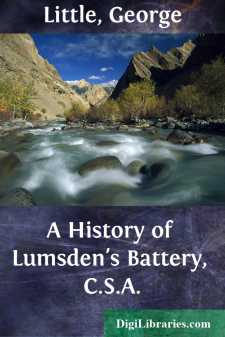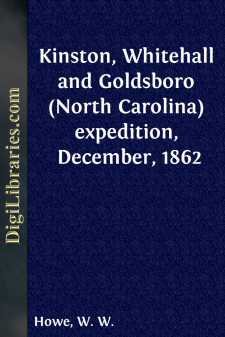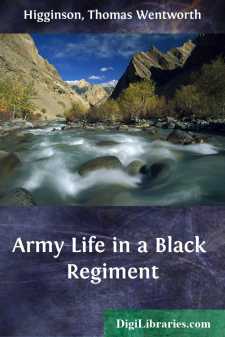History
- Africa 30
- Americas (North Central South West Indies) 50
- Ancient 68
- Asia 58
- Australia & New Zealand 8
- Canada 41
- Caribbean & West Indies 1
- Civilization 20
- Eastern Europe 12
- Europe 310
- Expeditions & Discoveries 60
- General 77
- Historical Geography 1
- Jewish 9
- Latin America 3
- Medieval 8
- Middle East 13
- Military 248
- Revolutionary 8
- Study & Teaching 5
- United States
- Western Europe 56
- World 13
United States Books
Sort by:
by:
George Little
At the close of the spring term of the Circuit Court of Tuscaloosa County, Alabama, in May, 1861, Judge Wm. S. Mudd announced from the bench that Mr. Harvey H. Cribbs would resign the office of Sheriff of the County for the purpose of volunteering into the Army of the Confederate States and would place on the desk of the Clerk of the Court an agreement so to volunteer signed by himself, and invited all...
more...
INTRODUCTION. While our absent brothers are battling on the field, it is becoming that the friends at home should be eager for the minutest particulars of the camp-life, courage and endurance of the dear boys far away; for to the loyal lover of his country every soldier is a brother. The narrative related on the following pages is one of extraordinary "daring and suffering," and will excite an...
more...
PREFACE. I have endeavored to prepare the following narrative from authentic material, contemporaneous, or nearly contemporaneous, with the events described. The main source of information is the official reports of battles and operations. These reports, both National and Confederate, will appear in the series of volumes of Military Reports now in preparation under the supervision of Colonel Scott,...
more...
PREFACE. In deference to the judgment of two or three literary friends, I have entitled this, my first attempt at authorship, "The Narrative of a Blockade-runner." They do not agree with Shakspeare that "a rose by any other name would smell as sweet," to the reading public; nor that it is always advisable to call a thing by its proper name. It will be seen, however, by any reader who...
more...
PREFACE The writer of this book was a volunteer officer in the Union army throughout the war of the Great Rebellion, and his service was in the field. The book, having been written while the author was engaged in a somewhat active professional life, lacks that literary finish which results from much pruning and painstaking. He, however, offers no excuse for writing it, nor for its completion; he has...
more...
Infantry attacks with its fire, or with the bayonet. Which of these is the more effective? 1. The object of an attack is to destroy or capture the hostile force, or, at least, to drive it from the field. Capturing the enemy, or driving him from the field, cannot usually be effected by merely firing upon him. True, a mere fire at a distance may finally destroy him. But an insuperable objection to this...
more...
by:
W. W. Howe
Major General J. G. Foster commenced a movement of his army from New Berne this morning. At 3 p. m. we came upon the enemy's pickets (near our present camping ground), when three prisoners were taken by the advance guard of the Third New York Cavalry. In attempting to press forward we found the road densely blockaded by felled trees; this blockade extended for several hundred yards, being situated...
more...
PRELIMINARY. The naval operations described in the following pages extended, on the seaboard, over the Gulf of Mexico from Key West to the mouth of the Rio Grande; and inland over the course of the Mississippi, and its affluents, from Cairo, at the southern extremity of the State of Illinois, to the mouths of the river. Key West is one of the low coral islands, or keys, which stretch out, in a...
more...
by:
A. K. Browne
THE STORY. On Sunday, June 12th, 1864, the U. S. Steamer Kearsarge was lying at anchor in the Scheldt, off Flushing, Holland. Suddenly appeared the cornet at the fore—an unexpected signal, that compelled absent officers and men to repair on board. Steam was raised, and immediately after a departure made, when all hands being called, the nature of the precipitate movement became apparent. Captain...
more...
Chapter 1. Introductory These pages record some of the adventures of the First South Carolina Volunteers, the first slave regiment mustered into the service of the United States during the late civil war. It was, indeed, the first colored regiment of any kind so mustered, except a portion of the troops raised by Major-General Butler at New Orleans. These scarcely belonged to the same class, however,...
more...











